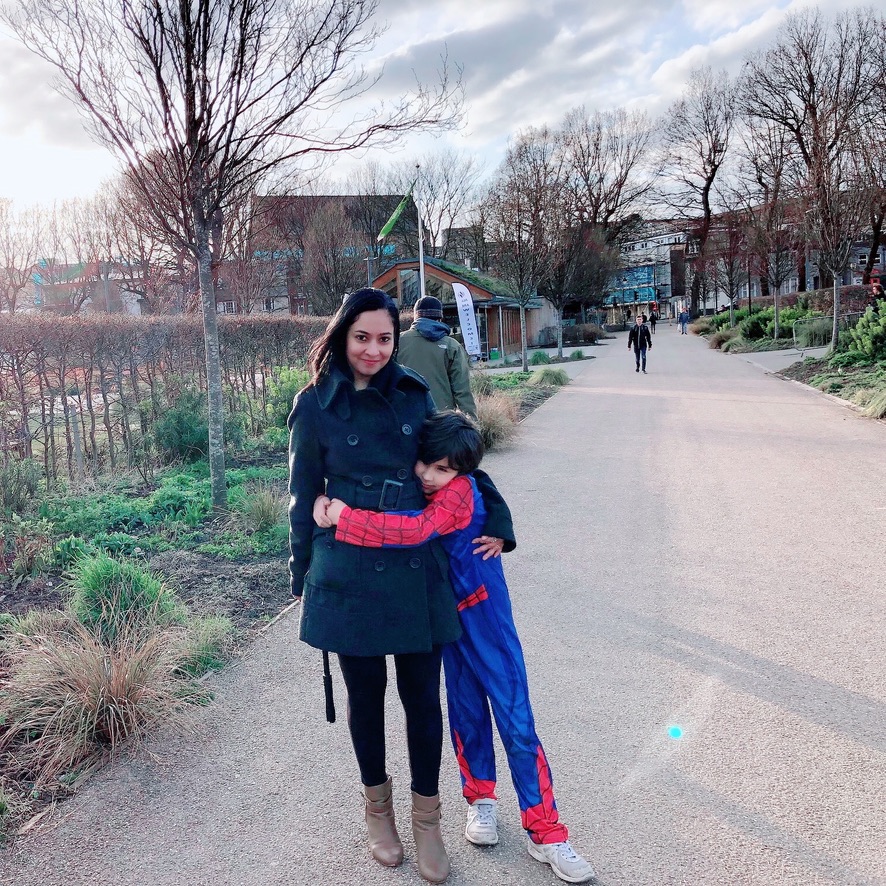
Hi friends,
Spring 2018. I’m on a Facebook livestream with two dozen writers, answering questions, helping people think through ideas, and suggesting next steps, when a question stops me in my tracks:
“Would you rather be called a writing coach or a writing instructor?”
I falter. I hesitate. I’m suddenly nervous and I’m not sure why. I compose myself and answer quickly, before this ends up being a long conversation, before I’m asked to elaborate, before I need to explain myself.
“I don’t really care what you call me,” I say.
This is a lie.
Four years before this moment, I moved from India, where I had a thriving journalism career, to the UK, where I… well, didn’t. I lived in a small town where I was often the only brown person in the room, where people would learn my dog’s name but not mine, where I was repeatedly confused with the only other Indian mum at my kid’s school and my kid experienced racism at the age of 5 at the hands of a teacher.
My world was shrinking, but it didn’t matter because my business was expanding. I had just retired my husband, I was making £15k a month, I had written and published eight books for writers, almost all of them Amazon bestsellers, and even though I missed reporting in India, my family was safe, my kid was happy, and my bills were paid.
The success of the business allowed me to create a bubble and shield myself from the truth, which was that I no longer recognized my life, I no longer recognized my work, and that even though I was doing well by the world’s standards, I knew unquestionably that I was climbing the wrong ladder, becoming more and more successful at the wrong thing.
That even though I was helping writers build six-figure businesses, break into top publications, and live out their dreams, it was coming at the expense of my own.
The question, “Would you rather be called a writing coach or a writing instructor?” pierced through my bubble of bullshit and brought the truth home.
I don’t want to be called a writing instructor. I don’t want to be well known as a writing coach. I’m a journalist, a novelist, a writer. That’s what I’d like to be called. That’s what I’d like to be known as.
More importantly, that’s what I want to do.
My head was too far up my own arse to articulate this at the time and so instead slowly, bit by bit, I started sabotaging. I disappeared from social media, I stopped showing up here and telling the truth, I made everything in my business transactional, and most of all, I started taking it all much too personally. I went into dangerously depressive spirals more times than I can count.
However, because I’m not a complete moron (only a partial one), I also started making some positive changes. I moved to Brighton and enrolled my kid in one of the most progressive schools in the country. I wrote two novels. I learned everything I could about good storytelling. I practiced every minute of every day, writing up to 10,000 words a day every day for months. I switched agents. I let my business go into losses and asked my (beautifully brilliant) husband if he’d consider getting a job while I figured things out. I dipped my toes back into journalism. I started working with a tech company so I could become an expert at newsletter growth.
I started asking the question, “What do I really want?” and sitting with the discomfort of not knowing what road would lead me there.

At a particularly low point last year, I reached out to Sam Barcroft, a media entrepreneur who sold his company for $30 million in 2020. (Check out his new blog Creatorville here.)
Sam is an old friend and someone I consider a mentor, and key among the many great pieces of advice he gave me was to consistently keep creating things and getting them in the hands of readers.
This ensures that:
- You’re giving yourself the chance for a surprise hit in case something takes off unexpectedly, and
- You’re creating a body of work that, over time, the gatekeepers will not be able to ignore.
This advice spoke to me because I’ve done it before.
In 2001, I was a 19-year-old college student in India who had no chance of being taken seriously as a journalist by Western publications. So I built up an email list of 7,000 readers, reported pieces for smaller publications as though I were writing forThe New York Times, and made sure my website was the top search result for “freelance journalist India.” (Which is how Sam found me.)
By 2009, I was on the guest list for parties thrown by TIME magazine and getting emails from editors wanting to give me work. I heard frequently from US and UK agents wanting to sign me for “any book you may want to write in the future.”
I spent my twenties learning to be a journalist.
I spent my thirties learning to run a business.
Now, having just entered my forties, I want to learn how to combine both.
The question I want to answer is: How do I consistently fund my storytelling without losing creative control or having to seek permission from gatekeepers?
I’m experimenting with a few different models.
Beginning with this book I’m crowdfunding.
It’s not the answer. But it’s a step forward.
I’m stepping forward.
Cheers,
Natasha